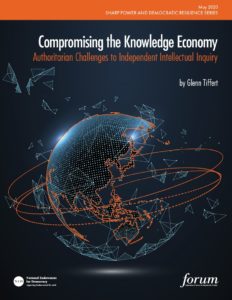
Václav Havel 1965. Source Wikimedia Commons
Václav Havel was spot on when he wrote: ‘The natural disadvantage of democracy is that it is extremely tiring to those who mean it honestly, while it allows almost everything to those who do not take it seriously’, said EU Vice-President Věra Jourová.
The founding fathers of the European Union “were perhaps too optimistic,” she added. “They didn’t foresee that European politicians, after experiences with tragic war and authoritarian rule from both right and left, would be tempted to take inspiration from an authoritarian playbook,” she told a B’nai B’rith event on “Threats to democracy during the COVID-19 crisis.”
“Democracy is fragile and needs to be taken care of. she added. For some, this might sound strange that we occupy ourselves with such a “trivia” like values. But I have lived through the experience of authoritarian regime in the Communist Czechoslovakia. I know things can go wrong and that rights, freedom and democracy is not a given, said Jourová, who is preparing a European Democracy Action Plan to help improve the resilience of our democracies and address threats, including external electoral interference and disinformation.
 Five years ago, Jürgen Habermas warned that the hollowing out of democratic substance from political institutions would leave liberal market democracies as “mere facade democracies.”
Five years ago, Jürgen Habermas warned that the hollowing out of democratic substance from political institutions would leave liberal market democracies as “mere facade democracies.”
Numerous others, including Nobel laureate Joseph Stiglitz, have noted that the distance between what democratic political institutions promise and what they deliver has grown too large to ignore. Enter the novel Coronavirus pandemic, which presents a test for the legitimacy of democratic governance, in addition to virtually unprecedented public health and economic challenges, adds Alicia Ely Yamin, Senior Fellow in the Global Health and Rights Project (GHRP) at the Petrie-Flom Center, a collaboration with the Global Health Education and Learning Incubator (GHELI) at Harvard University.

@NDITech
As is evident from many of the analyses in a recent symposium, preserving and renewing democratic legitimacy in the wake of this global calamity calls for re-imagining social contracts, she writes.
Will the Pandemic Weaken Russia’s ‘Deep State’—or Make It Stronger Still? asks CFR analyst Stephen Sestanovich. Medically, the pandemic is a disaster for Russia. Politically, it depends on where you sit, says the former @NEDemocracy board member.
Recognizing how his leadership has been weakened by the dual crises of regime stability and an international oil war, Vladimir Putin has shifted Russia’s pandemic response to the regional institutions that he himself dismantled over his decades-long rule, notes Mike Smeltzer, Freedom House Research Analyst for Europe and Eurasia.
 As was perhaps to be expected, Russia’s local and regional governing institutions are failing to meet the challenge, he adds. Unfortunately, the country’s other weakened democratic institutions, most notably the media and civil society, are feeling the knock-on effects of poor local governance. Despite Putin’s decision to avoid blame, his approval numbers have fallen to historically low levels.
As was perhaps to be expected, Russia’s local and regional governing institutions are failing to meet the challenge, he adds. Unfortunately, the country’s other weakened democratic institutions, most notably the media and civil society, are feeling the knock-on effects of poor local governance. Despite Putin’s decision to avoid blame, his approval numbers have fallen to historically low levels.
@RealClearWorld features @HooverInst Glenn Tiffert’s report (left) for the National Endowment for Democracy’s #ThinkDemocracy on the threats posed by authoritarian powers such as China and Russia to the independent university and publishing sectors. RTWT







